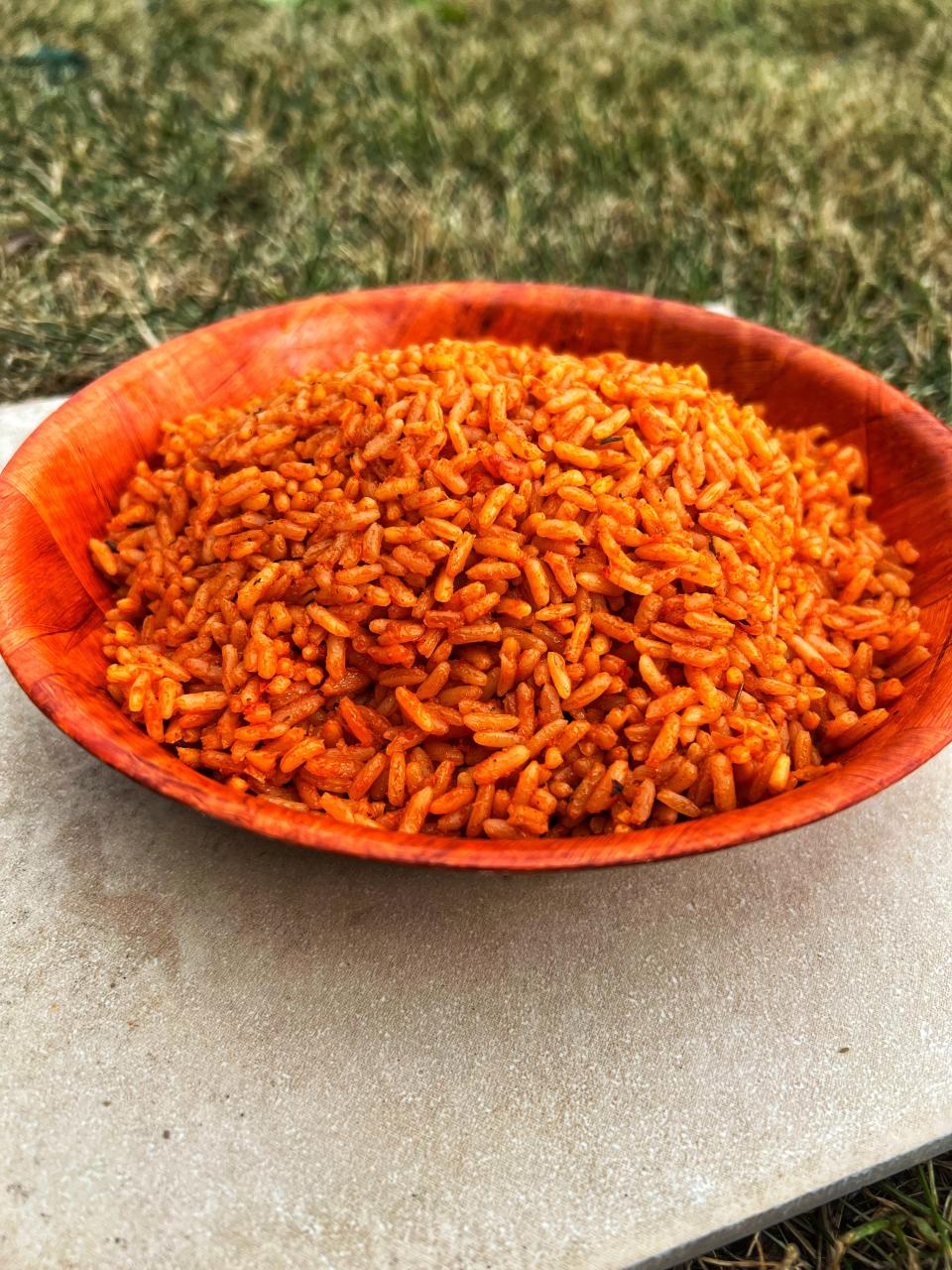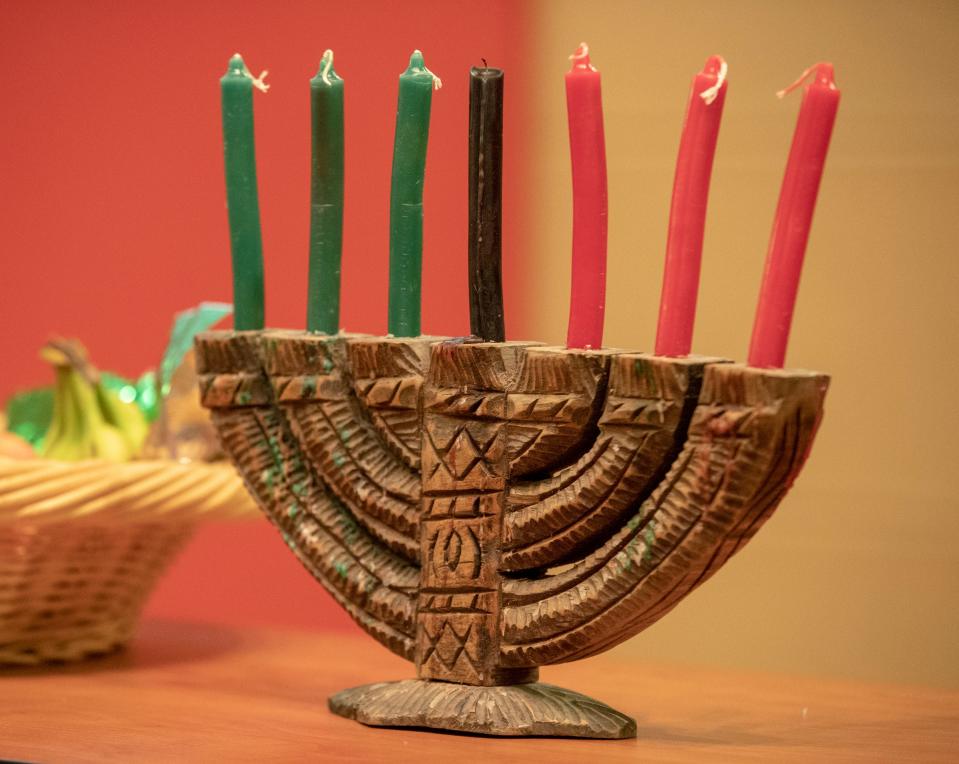For this Phoenix chef, Kwanzaa 'bridges the gap' between African and American traditions
For chef Patience Ogunbanjo of Lasgidi Cafe in Phoenix, Kwanzaa is a relatively new tradition, and one she's fallen in love with.
Originally from Nigeria, she did not celebrate Kwanzaa her entire life, as it is an American holiday that began in 1966 for Black Americans to honor their African roots and inspire a Black cultural revolution. She said it wasn't until college that she learned about the holiday and its history. Ogunbanjo's first experience was a celebration in her college dorm hosted by an RA.
"To have something that, to me, kind of bridges the gap between African tradition and African American tradition is huge," Ogunbanjo said. "And so, I kind of took to Kwanzaa back then."
She continued to celebrate each year and was especially inspired by a friend in Philadelphia whose father owned an Afrocentric bookstore and would hold one of the biggest Kwanzaa celebrations in Philly with different events every night for guests to celebrate the seven principles of the holiday together.

Kwanzaa 'bridges the gap between African tradition and African American tradition'
Celebrated for seven days from Dec. 26 to Jan.1 each year, each day of Kwanzaa represents one of the holiday's principles: Umoja (unity), Kujichagulia (self-determination), Ujima (working together), Ujamaa (cooperative economics), Nia (purpose), Kuumba (creativity) and Imani (faith). The seven principles also each correspond to a colored candle on the kinara.
Ogunbanjo described her parents as "traditional," with religion and spirituality playing a big role in their household. When she introduced Kwanzaa to her family, she said her dad especially enjoyed learning about the seven principles. Now, she celebrates each year with her extended family and close friends.
The sixth day of Kwanzaa is typically celebrated with a banquet, otherwise known as karamu.
This year, Ogunbanjo and her pop-up Nigerian kitchen Lasgidi Cafe will host a small karamu celebration for her friends and family, but next year, she hopes to host a much larger celebration for the African American community in Phoenix.
"So, this small family celebration this year is going to be kind of like a test run for something I really want to do, to expand into the community in the years to come," Ogunbanjo said. "We really don't have something like that in Phoenix."
45 years of family and fried cabbage: How a Gilbert couple honors their roots for Kwanzaa
What are traditional Kwanzaa dishes?

Most Kwanzaa feasts consist of one-pot dishes, Ogunbanjo said, adding that this is where her signature jollof rice comes in.
"Because you're coming from the transatlantic slave trade, a lot of those dishes were one-pot dishes," Ogunbanjo said. "You know, you didn't have the luxury of all the pots you could want, you don't have a Martha Stewart setup. You've got one pot, and you've got all your meats. And truly, cooking everything in one pot really retains all the different flavors from the different dishes that you're going to cook."
Other traditional Kwanzaa dishes include jambalaya, black-eyed peas, pepper pot soup and curry dishes, with a large emphasis on fresh fruits and vegetables of the harvest.
Ogunbanjo's Jollof recipe is a secret revealed only in her cooking classes, but she said the basics of Jollof rice are bell peppers, tomatoes and onions, the "trifecta," which forms the base of most Nigerian dishes along with curry powder, thyme and bay leaf for seasoning.
"For me, one of the keys to Jollof rice is actually cooking down your pepper base," Ogunbanjo said. "You know that tomato is very tart, and the taste of peppers can be super tangy. So, the longer you let it simmer, like a traditional tomato sauce, the better it's going to taste."
For this year's feast, Ogunbanjo is planning a traditional Senegal-inspired Jollof with nods to jambalaya. The dish will include an abundance of veggies, meat and salted fish.
Using food as a way to connect to heritage and to the larger African community
Ogunbanjo feels that food is a great way for the community to connect to their African roots. She recalled a recent interaction with her daughter's school guidance counselor who shared with Ogunbanjo that she "always felt in her gut that she was Nigerian." After a DNA test confirmed her Nigerian origins, she was able to further connect to that lost heritage by ordering Ogunbanjo's dishes for Thanksgiving.
"She was able to bridge that gap for her roots and her history and know a little bit about where she's from," Ogunbanjo said. "And she's now able to share a little bit of that with her family on her dinner table as well."
Next year, Ogunbanjo hopes to collaborate with other local business owners to offer more dishes and bring her small celebration community-wide.
"These are the types of events that are impactful, especially for the African American community here in Phoenix," Ogunbanjo said. "Since 2020, with the craziness that has been going on in the world, this Kwanzaa celebration is going to be really, really special for us to just give thanks, sit back, reflect and be able to prepare for the new year."

'Jollof rice is the heart of Africa:'Where to try Jollof rice in metro Phoenix
Reach the reporter at endia.fontanez@gannett.com. Follow @EndiaFontanez on Twitter.
Support local journalism. Subscribe to azcentral.com today.
This article originally appeared on Arizona Republic: Kwanzaa 2022: A Phoenix chef connects African and American traditions

